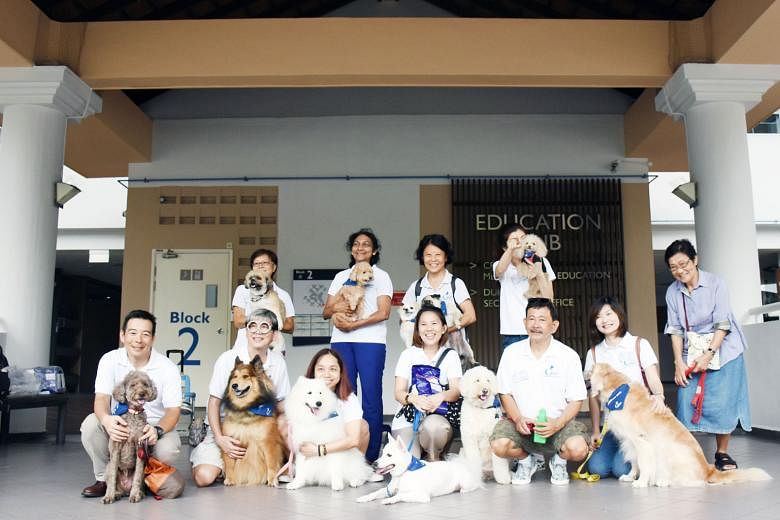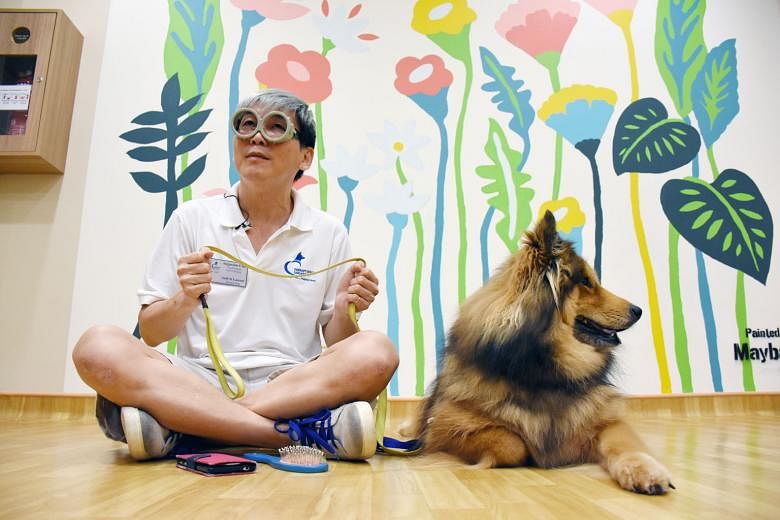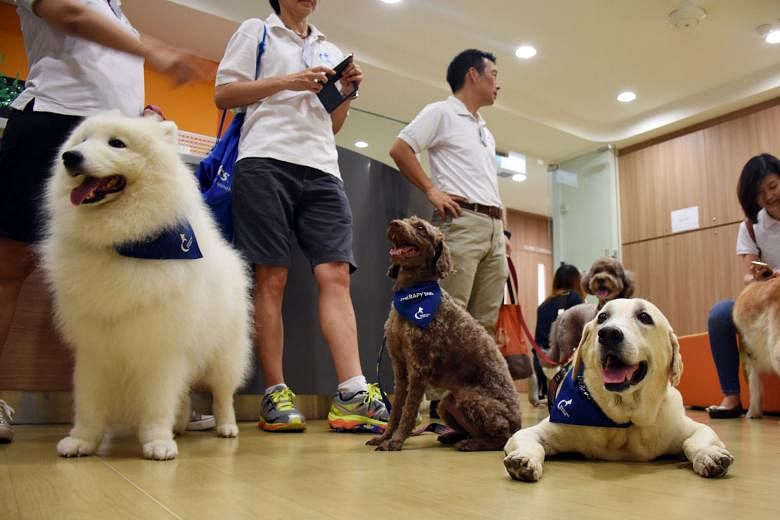On a recent afternoon at the Institute of Mental Health, some patients are lounging about and talking to friends and visitors, when suddenly a buzz runs through the room and curious voices are raised.
The source of the excitement? Eleven dogs that have entered the room, along with their owners.
An interesting scene emerges minutes later. A golden retriever lies placidly on the floor, as a teenage girl strokes its fur. A chihuahua cosies up to an elderly man and snuggles in his lap, while Audi, a mixed samoyed and poodle with a fluffy, golden-brown coat, easily warms up to patients in the lounge.
These special visitors to IMH's Mood Disorders Unit are from Therapy Dogs, Singapore (TDS), a non-profit voluntary welfare organisation formed by a group of dog owners to help people with needs.
Formed in 2004, the group partners seven institutions to offer pet-assisted therapy, which refers mainly to animal-assisted activity, where residents interact freely with the animals under the supervision of volunteers.
The group also provides animal-assisted therapy, an eight-week programme for individual patients, which is carefully managed and involves physiotherapists as well as occupational therapists.
People can be more comfortable with a pet dog than with a human being, TDS president Jun Sochi, 51, told The Straits Times.
The Straits Times understands that besides TDS, Save Our Street Dogs also offers dog therapy under the Healing Paws programme.
Mr Sochi joined TDS two years ago and volunteers with Topper, his 10-year-old labrador-poodle. He works full time as a managing director at facilities services and management company C&W Services.
"The residents might be reserved at first, but this changes when they start petting and talking to the dogs. It's easy for them to make an emotional connection," he said.
The TDS activity sessions with the dogs usually last for an hour. Besides IMH, they are held at Bethany Methodist Nursing Home, AWWA School, Thong Teck Home for Senior Citizens, Sunshine Welfare Action Mission Home, Bishan Home for the Intellectually Disabled and Mindsville@Napiri.
TDS conducts an average of 10 visits per month. It also organises ad hoc visits to the School of the Arts and National University of Singapore, to ease students' stress before examinations.
It has 130 volunteers, of which 70 per cent are active. It also has 110 therapy dogs, which go through a rigorous selection process before they can step up to the plate.
The dogs, all owned by the group's volunteers, must be healthy and have received a list of vaccinations. They must also be at least one year old or ideally two years old, the age of social maturity in dogs.
The animals must also receive basic obedience training. It is preferable for them to go through the Good Canine Citizen Programme, a six-week course which promotes responsible dog ownership and the training of well-mannered dogs.
The dogs must also have a good temperament. They must be able to remain calm while being patted by more than one person.
TDS vice-president Augustine Chai, 49, said: "The dogs can't be aggressive. They must be friendly with both humans and other dogs, and they can't be afraid of wheelchairs."
In activity sessions with dogs, patients can pat the dogs, brush their fur and play with them. These actions, which serve as basic exercises, help to improve patients' mobility, said Mr Chai, an events organiser and owner of two dogs - Audi, four, and Porsche, a six-year-old samoyed.
The dogs have a way of getting residents to open up to them, he added.
He cited a centenarian at Sunshine Welfare Action Mission Home, who used to dislike dogs. When volunteers approached her, she would tell them to go away.
This was until Audi sat next to her quietly. She did not reject him and, with guidance, started patting him.
"Like the other residents, she is much happier now, and looks forward to seeing him," said Mr Chai.
The dogs know the difference between work and play, he added.
"When they wear their bandanas, they know that they're going to work, and that it's not the same as gai gai (going out for leisure). As volunteers, we also find meaning in helping out with our pets."





